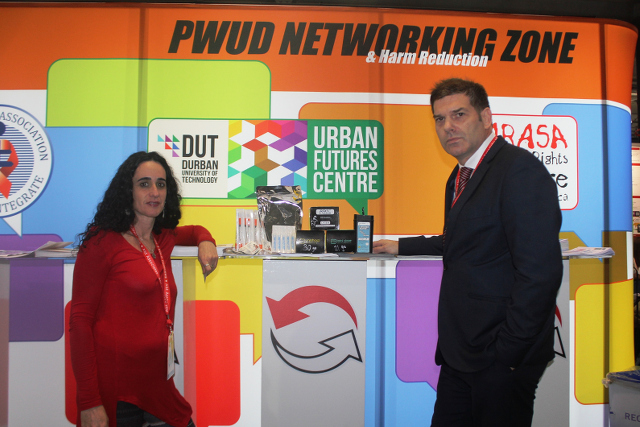As the 21st International AIDS Conference wrapped off with calls for more global funding, the search for a cure continues and the aim is to have one possibly by 2030.
The International AIDS Conference is the largest conference on any global health or development issue. First convened during the peak of the AIDS epidemic in 1985, this conference continues to provide a unique forum for the intersection of science and advocacy, and an opportunity to strengthen policies and programmes to ensure an evidence-based response to the epidemic.
The International Aids conference hosted more than 15 000 local and international delegates from around the world where each and every one participated in the vital, information sharing platforms pertaining to HIV/AIDS.
While many local and international delegates took to the platforms, discussing issues of funding, key research areas and the universal access to medicines, another zone also played a vital part at the conference. This was the Harm Reduction Networking Zone which was located in the Global Village of the AIDS Conference at the Durban Exhibition Centre.
The Global Village was a diverse and vibrant space where communities gathered from all over the world to meet, share and learn from each other and to see how science translates into community action and intervention.
The Durban University of Technology’s Urban Futures Centre (UFC@DUT) partnered with the TB/HIV Care Association (a non-profit organisation that puts integrated care at the heart of responding to TB and HIV), in running this zone.
Professor Monique Marks currently heads up the newly established UFC@DUT. She also runs a large community engagement project in Durban’s largest low income municipal housing estate, Kenneth Gardens. Prof Marks explained the important functions provided by the Harm Reduction Networking Zone, which was a place designed to chill out, network and collect information on drug use related issues. She also said, unique to the zone was that it was also a place where drug users, attending the conference, could come along to get their harm reduction packs from a safe environment or just come for a chat with the volunteers.
“People who take drugs are a particularly vulnerable group with regards to HIV. The UFC@DUT is a research entity that aims toward designing and implementing innovative solutions to existing problems, and had aligned itself with the international Harm Reduction movement as a more human rights approach to drug use disorders in urban spaces. The different types of activities that took place included the provision of clean needles and syringes, a psychiatrist to consult with delegates from the conference needing assistance with prescriptions, if required. Also, the zone provided a range of talks and documentaries related to harm reduction and to drug use policy. Thirdly, it was a ‘chill out’ zone for people who used drugs to meet with one another in a safe space,” she said.
One of the volunteers from the TB/HIV Care Association at the zone was active drug user, Ursula, who explained that the harm reduction packs which included, needles, alcohol swabs, saline solutions, etc., were handed out to drug users attending the conference in a safe environment. “It opened my eyes by being at such a conference as I found out that the international delegate drug user was not ashamed of using drugs and was fully, functional normal adults in society. For me, this conference has made me more passionate about helping others in KwaZulu-Natal, especially educating the older generation on their mindset regarding drug use,” she added.
Also, playing a vital role at the zone was Advocacy and Psychosocial Co-ordinator, Shaun Shelley, who said that the zone was a great platform to promote and share ideas around harm reduction drug policies. Shelley is committed to furthering the understanding and treatment of addiction, as well as advocating for changes to drug policies at local and national level. He explained that sex workers and transgenders, to name but a few, were regarded as key population groups in South Africa, those that are most at risk of HIV infection. “Also, the HIV prevalence rate amongst sex workers in South Africa is estimated to be between 59 and 71 per cent, one of the highest in the world. So, testing and treating of sex workers has to become a priority for the government and NPOs. In South Africa, drug use is criminalised and often incorrectly blamed for an array of social ills, a simplistic conventional wisdom that doesn’t give due consideration to the multiple and complex drivers of poverty, crime, and drug use itself. This misunderstanding of drug use has led to high levels of stigmatisation and exclusion. Drug users in South Africa must be seen as people who deserve the same rights as everyone else,” he said.
After the success of the Harm Reduction Networking Zone, going forward, Prof Marks hopes to work closely with government and the police and look at possibly establishing a drug consumption group where drug users could come at one place of safety for the purpose of using drugs in a safe environment.
The International AIDS Conference 2016 closed off, placing much emphasis and focus on the key populations such as sex workers, lesbians, gay, bisexuals and transgender persons, prisoners and intravenous drug users. The call also, is for more global funding and with the youth being a priority.
The next International AIDS Conference 2018 takes place in Amsterdam.
– Waheeda Peters
Pictured: DUT’s Prof Monique Marks with Advocacy and Psychosocial coordinator, Shaun Shelley, at the Harm Reduction Networking Zone.


